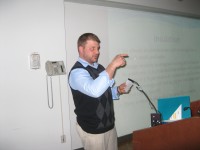Energy Conservation Discussed at Mahopac’s Climate Change Forum

Energy conservation not only can help protect the environment, is can also result in big savings for individuals, businesses and governments, a group of about 20 residents were told at the Mahopac Public Library on April 8.
Energy conservation was discussed during the “Climate Change Forum Part II,” which was presented by the Putnam County Coalition to Preserve Open Space, The League of Women Voters, Southeast Residents for Responsible Development and the Croton Watershed Clean Water Coalition.
Jesse Knapp, owner of Paragon Home Services in Fishkill, discussed how energy audits could show homeowners save money. There many ways energy can be wasted in a home, Knapp said. “A house is a very complex thing,” he said.
A home audit can tell an owner how energy is being wasted, Knapp said. An audit would recommend how homes could be better insulated, he said. Using proper insulation could save a homeowner $6,000 over a decade, he said.
Having a home thermostat go down by one degree every day could cut energy costs by five percent a year, Knapp said. Unplugging appliances not in use could save a homeowner between $50 and $100 a year, he said.
Nicholas D’Alessandro, vice president of tax efficient energy strategies for NES Energy in New York City, said America currently receives 50 percent of its energy from coal; 20 percent from nuclear power; 8 percent from hydro; and two percent from oil. “Thirteen percent is wasted,” he said.
D’Alessandro said several tax credits are available for property owners who make their homes or businesses more energy efficient. Tax credits are also for installation of such alternative energy systems as wind and solar power, he said.
One way individuals can reduce electricity usage is through the light bulbs they use, D’Alessandro said. A 100 watt incandescent bulb provides 750 hours of light, while a 26 watt compact florescent bulb provides 10,000 hours of light, he said.
Municipalities can also cut costs by using energy efficient light bulbs, D’Alessandro said. Light Emitting Diode (LED) bulbs can last for 100,000 hours, he said, adding that the bulbs actually emit “better light” than bulbs typically used in street lights.
Not only can homeowners conserve energy, businesses can also do the same, D’Alessandro said. By utilizing various means of energy conservation, DuPont saved $3 billion between 1990 and 2006, he said.
